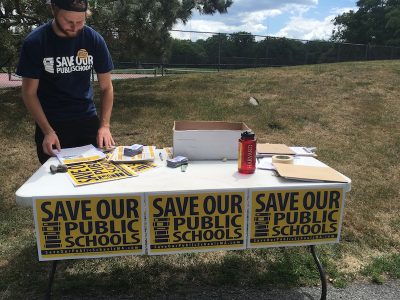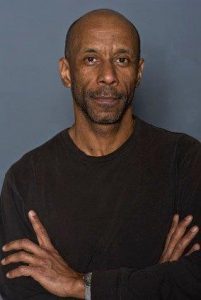Support the Campaign to Oppose the Charter School Ballot Question
By Sue Doherty
Delegates to this year’s MTA Annual Meeting made the critical decision to fight this fall’s ballot question that threatens to destabilize our public schools by expanding privately run, publicly funded charter schools The MTA has been working with a grassroots coalition of education, parent, student, and community groups on a “Save Our Public Schools” campaign to defeat a November ballot question that would lift the cap on charter schools.
This push to lift the charter school cap is an existential threat to our profession, our organization, and to the ideal of a democratic public school system that strives to provide equal educational opportunities for all students and that is accountable to local communities. As an educator from Brockton who cares about the education of all the children in the Commonwealth, I urge all supporters of public education to back this campaign.
Charter schools create two separate and unequal school systems while draining essential funds from districts. They are not held to the same standards as traditional districts and can set limits on enrollment periods and class sizes in ways that traditional districts cannot do. And although charter schools claim they take all students, data continues to show that they do not serve as many low-income, special education, or English Language Learners as do traditional public schools. This leaves the traditional public schools with a higher percentage of students who require more resources to educate while concurrently draining their resources. Massachusetts schools are already losing over $400 million a year to the eighty charter schools currently in operation. This loss of funds will only be exacerbated with the expansion of charter schools, and districts can’t afford it.
Creating charter schools and funding them by taking money from the sending public school districts has nothing to do with providing better educational opportunities for families and students. In reality, the push for more and more charter schools is part of a broader agenda to privatize schools in order to maximize profits for investors. The ballot question, which will allow for up to 12 new charter schools a year, is a perfect vehicle for creating a rapid but controlled transformation of entire public school districts to privatized, two-tier systems composed primarily of charter schools.
Our current Governor, Charlie Baker, and his Education Secretary, Jim Peyser, are strong proponents of school privatization through charter schools. Both men came out of the Pioneer Institute, a right-wing think tank that promotes charter schools, and Peyser admires the work that has been done in places such as New Orleans, which became the first all charter school district in the country in 2014. He sees this as one possible model for our state and seems committed to imposing it on a wide scale. In a 2014 article he laments that “only a few districts [such as New Orleans] are moving purposefully towards a diverse portfolio of autonomous and accountable schools, and most of these still have a long way to go before they have fully redesigned their public education systems.” (1)
Under Baker and Peyser, the charter school industry and its promoters in Massachusetts have an encouraging climate for working to “redesign our public education system” by lifting the cap on charter schools. Legislation proposed by Governor Baker to lift the cap and allow up to 12 new charter schools a year is currently working its way through the legislature, but it’s highly unlikely that the Senate, House, and Governor will be able to come to agreement on it. Therefore, the battle over lifting the cap will almost certainly be brought to the ballot box next November, where voters will decide whether or not the state should be able to authorize up to 12 new charter schools a year or add to enrollment where charter schools exist, with preference going to districts that rank in the bottom 25% on standardized test score achievement.
One of the most pressing reasons to support this campaign is that allowing up to 12 new charter schools every year would open up entire districts to charter school takeover in the “diverse portfolio” model being promoted by Peyser. By strategically targeting one city or town at a time, they could wipe out the remaining traditional Boston Public Schools in just six years; Springfield and Worcester in three; Brockton, Lynn, Lowell, Lawrence, New Bedford, and Fall River in two; and smaller districts in just one year. Charter schools could also go anywhere in the state and would no longer have any real limits based on “accountability” data. If there were more than 12 applications, the preference would go applications in the lowest 25% on achievement or to places where there is a lot of parent demand. But what happens once they fill up all the districts in the lowest 25% with charter schools, or if there is no parent or community demand? Once the charter school market is fully embedded into the system, they will almost certainly find ways to keep filling it.
Some voters might argue that we cannot approach this issue with a line in the sand and just say “no.” They will contend that charter schools are here to stay and there’s nothing we can do about it, so we should push a legislative compromise calling for stronger regulations while allowing for a cap lift. But if we compromise now or shrink in fear and the cap is lifted because we didn’t even try to fight, charter schools will begin to spread like a cancer through our Commonwealth.
The people who would privatize our public schools don’t care about children, learning, teaching, families, communities, equity, democracy, or our careers and livelihoods. They are motivated by money, power, and control. Once our public school districts are finally “fully redesigned” to resemble New Orleans, what will be left for our children and families? Of our profession? Or of community and democracy? Too much is at stake not to fight now. Commit to fully support the campaign to Save Our Public Schools.
For more information on organizing tips and training opportunities, you can email educatorsforademocraticunion@gmail.com.
(1) Peyser, Jim. “Redesigning School Districts: The Way Forward.” News + Ideas. NewSchools Venture Fund, 28 Apr. 2014. Web. 1 May 2016.
Farmer’s Markets: Ripe for Organizing
By Kelly Henderson
Talking to voters about a ballot question is much easier when there’s bushels of kale involved. I’ve been setting up a table and chatting with folks about the Save Our Public Schools campaign, and it’s been fruitful.
The trip to the local farmer’s market is a growing staple in many Massachusetts residents’ summer days. Bring the kids, bring the dog, bring your reusable tote bags. May I suggest, also bring your local community organizer. The farmer’s market is a great place to talk to local folks about issues that impact them as members of the community. They are also more likely to be chatty, since it’s expected that the trip will involve running into others in the community and exchanging pleasantries about crops this season with the farmers. In the past two visits to my local market, I’ve had about 100 little conversations with people about how charters affect local schools, and over 30 folks have signed commitment cards.
Here’s what I’ve learned:
- Make friends with the boss
There’s always a farmer’s market boss, and this person is usually very busy and unlikely to be excited for a long chat. This person is also not going to want to jeopardize any business, so a political campaign presence in the farmer’s market won’t be welcome. Your job is to be super nice, brief, and as non-political as possible. When you ask for space, ask for a little corner or something where you can set up a table and hand out information. Like you’re a little old lady who just wants to spread the word about the church garage sale. You will probably get a spot just outside the actual market – in our case, a patch of shady grass that turned out to be just delightful.
- Be prepared
It will be a long day outside, and you won’t stick it out if you’re uncomfortable. Bring sunscreen, an umbrella or raincoat, water, snacks, comfortable shoes, and a folding chair.
- Stock up on campaign materials
The last thing you want is to hear someone say, “Great can I have a bumper sticker” only to find you’ve run out. A big part of campaigning is visibility, so the more stickers, buttons, t shirts, and yard signs out there the better. Your MTA rep or local Save Our Public Schools organizer should be able to set you up with as much as you need. Don’t forget pens and clipboards so people can sign on to the campaign!
- You’re a teacher – act like it
You know how to explain stuff to people without being too wordy, too intimidating, too alienating – it’s what we do! So when you’re talking to people about the campaign, just explain in your best teachery way how the cap would affect you and your students. There’s no need to bash charters or throw around hyperbole; we are on the sensible side of things and when people are informed, they’re with us. Hopefully, you’re also a teacher in the same community the market is in, so you can talk about schools people know and count on.
- Actually go to the farmer’s market!
Support the market that’s invited you to be there. Buy some local produce, chat up the campaign with the vendors, and make the boss happy he/she gave you the go ahead to be there.

The End of Tuition
By Max Page & Dan Clawson
JUST A S surely as the sun rises on Provincetown and sets on Pittsfield, tuition and fees are again rising for students at public colleges and universities in Massachusetts. Students will work more hours, take on more debt, or drop out.
S surely as the sun rises on Provincetown and sets on Pittsfield, tuition and fees are again rising for students at public colleges and universities in Massachusetts. Students will work more hours, take on more debt, or drop out.
In the past decade, tuition and fees increased by thousands of dollars. This fall, they’ll jump by nearly 7.8 percent at the state universities and 5.8 percent at UMass.
Why? Because the story of the past 20 years has been a downward slope in public spending and an equivalent rise in tuition and fees. State appropriations for public higher education in Massachusetts are down 11 percent from spending levels in 2002, even though UMass, for example, now educates 30,000 more students. Tuition and fees have made up the difference.
Let’s jump off this annual merry-go-round of cuts, tuition hikes, and blame, and instead ask: Why are students paying tuition at all?
A large majority of the country now agree that some form of post-secondary education is essential to life success — not just a better-paying job, but the chance to fulfill one’s abilities and unique contribution. That conclusion is not confined to liberals. Margaret Spellings, secretary of education for George W. Bush, said,
“What a high school diploma was in the ’50s is akin, more and more, to at least two years of postsecondary education today.”
Until now. Free public higher education has gone mainstream. It’s not just that President Obama proposed free community college, or that Bernie Sanders made it a cornerstone of his campaign. Now Hillary Clinton, recognizing how crucial an issue this is to young voters, is going further than any previous party nominee: She has proposed making public colleges and universities free to students from families with incomes below $125,000 — that’s about 80 percent of all households.
It’s unlikely that Clinton will be able to enact her plan unless there are sweeping Democratic gains in Congress. But we don’t need to wait for Congress. Here in Massachusetts, a study by the Budget and Policy Center shows that free higher education at all public colleges and universities could be implemented at a cost of $631 million a year. If we applied a middle-income cap, or made only two years free, the cost would be a good bit less.
The money to do this could come in passage of the state Fair Share Amendment, which has the support of 70 percent of Massachusetts voters. By asking about 15,000 of the very wealthiest individuals to pay a bit more on their yearly income over $1 million, the state would generate close to $2 billion a year, far more than is needed to provide free public higher education to its residents, achieve a strong base for the knowledge economy, and a more educated democracy.
Max Page is a professor of architecture at UMass Amherst and a board member of PHENOM, the Public Higher Education Network of Massachusetts. Dan Clawson is a professor of sociology at UMass Amherst.
Story originally published in Boston Globe.
Weekly Update
![]()
There is power in numbers. Come join other educators, parents and social justice activists at the Save Our Schools March and National Call to Action on Friday, July 8, in Washington, D.C., and stay through July 9 for a conference at Howard University featuring a series of workshops. Rally speakers will include the Reverend William Barber, Jonathan Kozol, Diane Ravitch, Jitu Brown and other Dyett hunger strikers, Julian Vasquez Heilig, Denisha Jones, Gus Morales, Yohuru Williams and me.
Two buses will be leaving from Massachusetts on July 8, one from Boston and one from the New Bedford/Dartmouth area. They will return late on July 9. For just $30, a limited number of participants can get a seat on the bus, overnight accommodations and an event T-shirt.
Please e-mail UMass Dartmouth Professor Ricardo Rosa at ricardorosa1973@yahoo.com by June 27 to reserve your seat. Go HERE for more information.
GET A FREE COPY OF ORGANIZING HANDBOOK
The MTA is making copies of “Secrets of a Successful Organizer” available for free to members who are interested in reading and discussing it with colleagues over the summer. The book shows you how to fight back where you work – and win. It’s a step-by-step guide to building power on the job. For a copy of the book, published by Labor Notes, contact Ari Mercado at amercado@massteacher.org.
EDU plans to read this book in its summer and fall organizing efforts; every caucus member should have a copy!
MTA SOLIDARITY WITH OAXACAN TEACHERS!

In June, Sue Doherty (District 36C) and Sarah McKeon (District 14D) sponsored a New Business Item asking the MTA to stand in solidarity with protesting teachers in Oaxaca, Mexico. On June 19th, Mexican federal police opened fire on the demonstrators, killing 12 people. The MTA Board of Directors approved the NBI earlier this week.
The NBI states, “The MTA stands in support of and solidarity with our Mexican brothers and sisters in the CNTE (Coordinadora Nacional de Trabajadores de la Educación) and the SNTE (Sindicato Nacional de Trabajadores de la Educación), who are striking to defend the public education system of Mexico from the same profit-driven privatizers who are attacking teachers and our unions in countries across Latin America and around the world, including the US.”
The MTA will send a message of fraternal support to the CNTE and SNTE, request that the Mexican consul in Boston work to defend union rights in Mexico, and publicize the position on the MTA’s social media outlets.
New Board of Directors Seat
Support EDU member, Associate Professor Keith Washington as a candidate for MTA Board of Directors.
“Because of our expanding membership the Massachusetts State College Association (MSCA) has been granted a second seat on the Massachusetts Teachers Association (MTA) Board of Directors. I’m running for this newly created seat to be a ‘District Director.'”
“As you know, these are challenging times. Public and private sector unions are under attack. Massachusetts public education, Pre-K thru PhD is chronically underfunded. Unnecessary contract demands, rules and restrictions are being imposed on us. Many of our members are underpaid, most persistently our adjuncts, clerical and support staff. It will take our collective efforts to hold the line, and better yet, continue to make progress. Our collective efforts will make this happen.”

Vote No on Lifting the Charter Cap

Save Our Public Schools is a grassroots coalition of education, parent, student and community groups that supports quality public schools for all and opposes a November ballot question that would lift the cap on privately run, publicly funded Commonwealth charter schools.
The ballot question would allow the state to approve 12 new Commonwealth charter schools every year forever, eventually draining billions of dollars from our schools and destabilizing our public education system. It would encourage charters to expand into areas where they don’t exist now, taking critical resources away from successful public schools.
This year alone, charters will divert more than $400 million from public schools. That’s money districts desperately need so they can offer more science, technology, arts and music classes, as well as preschool services and smaller class sizes. The money should be kept in the public schools for the benefit of all students.
Charter schools are not accountable to their local communities. The state often approves them over the united opposition of the communities where they will be located. That’s wrong. Local communities should have the final say on what kinds of schools they want.
Charter schools are divisive, creating a two-track system described by the NAACP as “separate and unequal.” They typically underserve English language learners and special needs students, leaving public schools with fewer resources to educate a higher-need population.
Pro-charter groups have millions of dollars from hedge funds and corporate backers. We rely on people power to stand up for the students in our public schools. If some of our public schools are falling short, we should fix them — not keep taking money away and giving it to unaccountable charters.
Save Our Public Schools is a grassroots organization of Massachusetts families, parents, educators and students opposed to the ballot initiative to lift the charter school cap in Massachusetts. The MTA is a leading participant in this campaign, working closely with other members of the Massachusetts Education Justice Alliance.
Raise Up Massachusetts!
Join ‘Raise Up Massachusetts‘ in the campaign for the Fair Share amendment to the State Constitution to set aside 4 cents for every dollar of taxable income over one million dollars, to be earmarked for education and transportation. If successful, it would bring an estimated additional 2 billion dollars in state revenue to support the citizens of the Commonwealth.
From the campaign website:
The best way to help working families and build a stronger economy for us all is to make sure that we have quality public schools for our children, affordable public higher education, and a transportation system that allows people get to school or work, lets customers get to businesses, and helps everyone fulfill their daily tasks. Without investment in these common goals, working families fall behind and our communities suffer. New revenue is necessary to rebuild crumbling roads, bridges, and paths, improve our public schools, invest in fast and reliable public transportation, make public higher education affordable, expand opportunities for healthy walking and bicycling, and give every child access to high-quality early childhood education and preschool programs.
Below is the full text of the proposed amendment:
Amendment Article XLIV of the Massachusetts Constitution is hereby amended by adding the following paragraph at the end thereof: To provide the resources for quality public education and affordable public colleges and universities, and for the repair and maintenance of roads, bridges and public transportation, all revenues received in accordance with this paragraph shall be expended, subject to appropriation, only for these purposes. In addition to the taxes on income otherwise authorized under this Article, there shall be an additional tax of 4 percent on that portion of annual taxable income in excess of $1,000,000 (one million dollars) reported on any return related to those taxes. To ensure that this additional tax continues to apply only to the commonwealth’s highest income residents, this $1,000,000 (one million dollar) income level shall be adjusted annually to reflect any increases in the cost of living by the same method used for federal income tax brackets. This paragraph shall apply to all tax years beginning on or after January 1, 2019.



